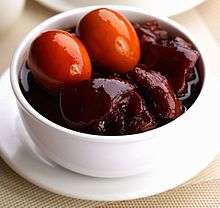Postpartum confinement
Postpartum confinement (also known as "Sitting the month": 坐月子 "Zuo Yue Zi" in Mandarin or 坐月 "Co5 Jyut2" in Cantonese) is a pseudoscientific [1]Chinese custom practised by many women of East Asian descent for recovery following birth, typically for 1 month, with regional variations at different lengths from 40 days, 2 months to 100 days.[2] Similar practices are popular among Japanese women called 産後の肥立ち and Korean women called 삼칠일 "Samchilil" for at least 21 days.[3] The custom is referred to as 'confinement' as women are advised to stay indoors for recovery from the trauma of birth and feed the newborn baby. Aspects of traditional Chinese medicine are included, with a special focus on eating foods considered to be nourishing for the body and help with the production of breastmilk. In Guangdong and neighboring regions, new mothers are barred from visitors until the baby is 12 days old, marked by a celebration called 'Twelve mornings' (known as 十二朝). From this day onwards, Cantonese families with a new baby usually share their joy through giving away food gifts such as pork knuckles with ginger and vinegar, while some families mark the occasion by paying tribute to their ancestors. In ancient China, women of certain ethnic groups in the South would resume work right after birth, and allow the men to practice postpartum confinement instead.[4]
Custom
Everyday habits and personal hygiene practices
During confinement, mothers are refrained to habits which may expose their body to physical agents such cold weather or wind that are claimed to be detrimental to their recovery. Specifically, mothers are not allowed[5] to:
- Wash their hair
- Take a bath or shower
- Climb the stairs
- Have contact with water
- Read books
- Cry
- Have sex
- Have wind exposure
- Sew
Nowadays, however, new mothers may wash their hair or take a bath or shower infrequently during the postpartum period, but it is claimed to be important to dry their body immediately afterwards with a clean towel and their hair properly using a hair dryer. It is also claimed to be important for women to wrap up warm and minimize the amount of skin exposed as it was believed that they may catch a cold during this vulnerable time.
Special foods

The custom of confinement advises new mothers to choose energy and protein-rich foods to recover energy levels, help shrink the uterus and for the perineum to heal. This is also important for the production of breastmilk. Sometimes, new mothers only begin to consume special herbal foods after all the lochia is discharged.
A common dish is pork knuckles with ginger and black vinegar as pork knuckles are believed to help replenish calcium levels in the women. Ginger is featured in many dishes, as it is believed that it can remove the 'wind' accumulated in the body during pregnancy. Meat-based soup broths are also commonly consumed to provide hydration and added nutrients. Although not entirely backed by scientific evidence, for example, fish and papaya soup is considered to help produce breastmilk.[6]
Seaweed soup is a popular item among Japanese and Korean mothers.
Postpartum care
Traditionally, women are typically taken care of by their elders. Increasingly, specialist confinement centres have been established for new mothers. Well known centres such as Red Wall Confinement Centre charge up to $27,000 for one month [7]. The use of Yue Sao, which are specialist postpartum carers are also very common in China. Yue Sao typically are live in domestic helpers and will assist with caring for both the new mother and baby for the first month after birth. Salaries for Yue Sao as at 2017 vary from RMB8000 to RMB20000 per month depending on city and experience.[8]
See also
References
- ↑ https://www.nytimes.com/2015/10/02/business/international/china-confinement-care-for-new-mothers-now-27000-a-month.html?_r=0
- ↑ "Confinement practices: an overview". BabyCenter. Retrieved 2016-03-21.
- ↑ "Little Seouls Blog: Korean Postpartum Rituals 삼칠일 (21 days)". littleseouls.blogspot.co.uk. Retrieved 2016-03-21.
- ↑ 《太平廣記》卷四八三引尉遲樞的《南楚新聞》記載:"南方有獠婦,生子便起。其夫臥床褥,飲食皆如乳婦。"《马可·波罗游记》:"傣族妇女产子,洗后裹以襁褓,产妇立起工作,产妇之夫则抱子卧床四十日";《黔记》卷二:郎慈苗在咸宁州,其俗更异,妇人产子,必夫守房,不逾门户,弥月乃出。产妇则出入耕作,措饭食,以供夫乳儿,日无暇刻。"
- ↑ 坐月子能洗头吗?坐月子洗头对身体有什么影响?
- ↑ "Milk booster: fish and papaya soup". BabyCenter. Retrieved 2016-03-21.
- ↑ "Red Wall Confinement Centre". New York Times. Retrieved 2017-07-24.
- ↑ "Yue Sao". Ayicheng. Retrieved 2017-07-24.